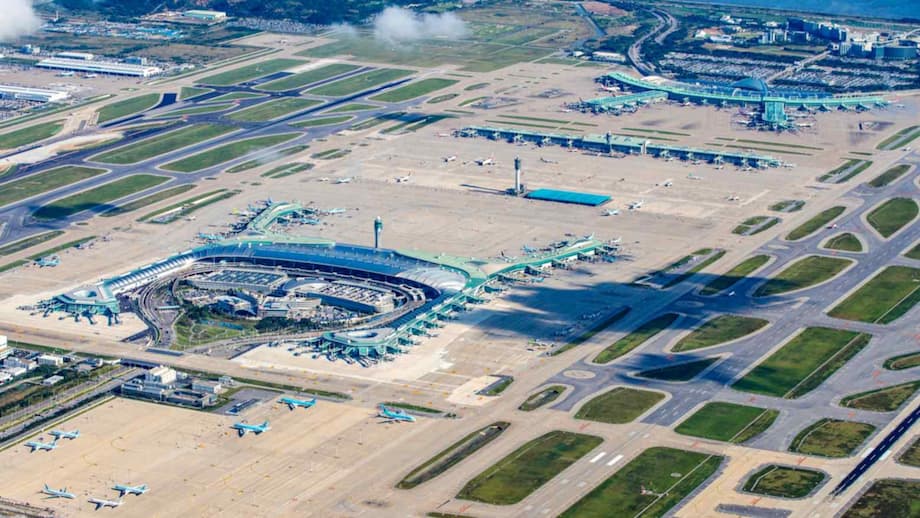Incheon Airport’s Historic Rise: Third Busiest International Hub in 2024
South Korea’s Incheon International Airport has achieved a remarkable milestone in 2024, rising to become the world’s third busiest airport for international passenger traffic. According to data released by Airports Council International (ACI), Incheon handled over 70.6 million international passengers last year, surpassing its previous records and outpacing many of the world’s most prominent aviation hubs. This achievement marks the airport’s highest global ranking since its opening in 2001 and signals a new era for South Korea’s role in international air travel.
- Incheon Airport’s Historic Rise: Third Busiest International Hub in 2024
- How Did Incheon Achieve This Milestone?
- Breaking Down the Numbers: Incheon’s Record-Breaking Year
- What’s Driving the Surge in International Travel?
- Incheon’s Role in Global Air Cargo
- Comparing Incheon to Other Global Hubs
- What’s Next for Incheon International Airport?
- Broader Implications: What Does Incheon’s Success Mean for Asia and the World?
- In Summary
How Did Incheon Achieve This Milestone?
Incheon’s ascent in the global rankings is the result of a combination of strategic investments, rapid post-pandemic recovery, and shifting travel patterns in Asia and beyond. The airport’s previous best ranking was fifth, achieved in both 2018 and 2019. In 2023, it stood at seventh place, but a surge in passenger numbers propelled it to third in 2024.
Several key factors contributed to this growth:
- Terminal and Infrastructure Upgrades: The completion of Incheon’s Phase 4 expansion increased its annual capacity to 106 million international passengers, making it the third-largest airport in the world by capacity.
- Network Expansion: Incheon now serves 98 airlines, connecting to hundreds of destinations worldwide. The expansion of routes, especially to short-haul destinations like Japan and China, played a significant role.
- Peak Season Demand: The airport saw record passenger volumes during the summer peak, the Chuseok harvest festival, and year-end holidays.
- Favorable Currency and Economic Trends: A favorable exchange rate and a rebound in regional economies encouraged more outbound and inbound travel.
Officials at Incheon International Airport Corp. also credited the airport’s digital transformation initiatives and its push to become an aviation AI innovation hub as part of its strategy to secure a lasting edge in global competition.
Breaking Down the Numbers: Incheon’s Record-Breaking Year
According to ACI’s 2024 World Airport Traffic Report, Incheon International Airport recorded 70,669,246 international passengers, a 26.7% increase from the previous year. This growth rate was the fastest among the world’s top five international airports. The airport’s 2024 passenger count also surpassed its previous record of 70,578,050 set in 2019, establishing a new all-time high.
Here’s how Incheon compared to other leading international airports in 2024:
- Dubai International Airport (DXB): 92,331,506 international passengers
- London Heathrow Airport (LHR): 79,194,330
- Incheon International Airport (ICN): 70,669,246
- Singapore Changi Airport (SIN): 67,063,000
- Amsterdam Schiphol Airport (AMS): 66,822,849
Incheon’s leap from seventh to third place in just one year is particularly notable given the competitive landscape of global aviation, where established hubs in Europe and the Middle East have traditionally dominated the rankings.
What’s Driving the Surge in International Travel?
The aviation industry in 2024 experienced a robust rebound, with global international passenger traffic rising 8.4% compared to 2023 and surpassing pre-pandemic levels by 2.7%. ACI reported that airports worldwide processed over 9.4 billion passengers in 2024, with international travel accounting for a significant portion of this growth.
Several trends have fueled this surge:
- Resumption of Asian Travel: The reopening of Asian markets, particularly China and Japan, led to a dramatic increase in regional travel. Incheon saw passenger numbers to Japan rise by 31%, to China by 93%, and to Northeast Asia by 37% compared to 2023.
- Short-Haul Demand: There was a marked increase in demand for short-haul international routes, especially between major Asian cities. Routes like Seoul Incheon–Tokyo Narita and Seoul Incheon–Osaka Kansai ranked among the world’s busiest in 2024.
- Premium Travel Growth: The demand for business and first-class travel surged globally, with airlines reporting record numbers of premium passengers. This trend was especially pronounced in Asia, where business and leisure travel increasingly overlap.
ACI World Director General Justin Erbacci commented on the resilience of the industry:
“The world’s busiest airports have demonstrated remarkable adaptability and resilience, serving as vital hubs for trade, commerce, and global connectivity.”
Incheon’s Role in Global Air Cargo
In addition to its passenger traffic success, Incheon International Airport maintained its third-place ranking in international air cargo operations in 2024. The airport handled 906,067 tons of cargo, a 7.4% increase from the previous year. Only Hong Kong International Airport and Shanghai Pudong International Airport handled more international cargo.
This growth was driven by several factors:
- E-commerce Boom: The global surge in e-commerce, especially in Asia, increased demand for air cargo services.
- Supply Chain Diversification: Companies sought to diversify supply chains in response to geopolitical tensions and maritime disruptions, boosting air freight volumes.
- Investment in Cargo Facilities: Incheon invested in expanding and modernizing its cargo infrastructure to handle larger volumes efficiently.
Comparing Incheon to Other Global Hubs
While Incheon’s rise is impressive, it’s important to understand how it fits into the broader landscape of global aviation. The world’s busiest airport by total passenger traffic remains Hartsfield-Jackson Atlanta International Airport (ATL) in the United States, which handled over 108 million passengers in 2024. However, Atlanta’s numbers are driven primarily by domestic travel, whereas Incheon’s ranking is based solely on international passengers.
Dubai International Airport continues to dominate international travel, followed by London Heathrow. Incheon’s rise to third place puts it ahead of other major Asian and European hubs like Singapore Changi, Amsterdam Schiphol, and Paris Charles de Gaulle.
Here’s a snapshot of the top 10 airports by international passenger traffic in 2024:
- Dubai International Airport (DXB) – 92,331,506
- London Heathrow Airport (LHR) – 79,194,330
- Incheon International Airport (ICN) – 70,669,246
- Singapore Changi Airport (SIN) – 67,063,000
- Amsterdam Schiphol Airport (AMS) – 66,822,849
- Paris Charles de Gaulle Airport (CDG) – 64,469,356
- Istanbul Airport (IST) – 62,975,429
- Frankfurt Airport (FRA) – 56,185,219
- Hong Kong International Airport (HKG) – 54,032,776
- Hamad International Airport (DOH) – 52,714,976
What’s Next for Incheon International Airport?
With its new record and expanded capacity, Incheon International Airport is poised for continued growth. The airport served 18.6 million passengers in the first quarter of 2025 alone, the highest quarterly figure since its opening. Projections for the full year estimate passenger traffic could reach between 73.03 million and 76.64 million, potentially surpassing the 73 million mark for the first time.
Looking ahead, Incheon’s management is focused on several strategic priorities:
- Digital Transformation: The airport is investing in advanced technologies, including artificial intelligence, to streamline operations and enhance the passenger experience.
- Network Expansion: Continued efforts to attract new airlines and open new routes, particularly to emerging markets in Southeast Asia and beyond.
- Sustainability: Incheon is committed to reducing its environmental footprint through green initiatives and sustainable infrastructure development.
The airport’s president and CEO emphasized the importance of innovation:
“We will continue to pursue digital transformation and the development of an aviation AI innovation hub to secure a lasting edge in global competition.”
Broader Implications: What Does Incheon’s Success Mean for Asia and the World?
Incheon’s rise reflects broader shifts in the global aviation industry. Asia is now at the forefront of international air travel growth, with airports in the region showing some of the fastest recovery and expansion rates post-pandemic. The resurgence of travel in China, Japan, and Southeast Asia has reshaped global travel patterns, challenging the dominance of traditional Western hubs.
This trend has several implications:
- Economic Impact: Airports like Incheon are engines of economic growth, supporting tourism, trade, and employment both locally and regionally.
- Connectivity: Enhanced connectivity between Asia and the rest of the world facilitates business, cultural exchange, and global mobility.
- Competition: The rise of Asian hubs intensifies competition among global airports, driving innovation and improvements in service quality.
As international travel continues to rebound, Incheon’s success story serves as a case study in how strategic investment, adaptability, and a focus on passenger experience can propel an airport to the top of the global rankings.
In Summary
- Incheon International Airport ranked third globally for international passenger traffic in 2024, handling over 70.6 million passengers.
- The airport’s rise was driven by infrastructure expansion, network growth, and a surge in regional travel demand.
- Incheon also ranked third in international air cargo, reflecting its role as a major logistics hub.
- Asia’s airports are leading the global recovery in air travel, challenging traditional Western dominance.
- Incheon’s continued investment in technology and sustainability positions it for future growth and competitiveness.












